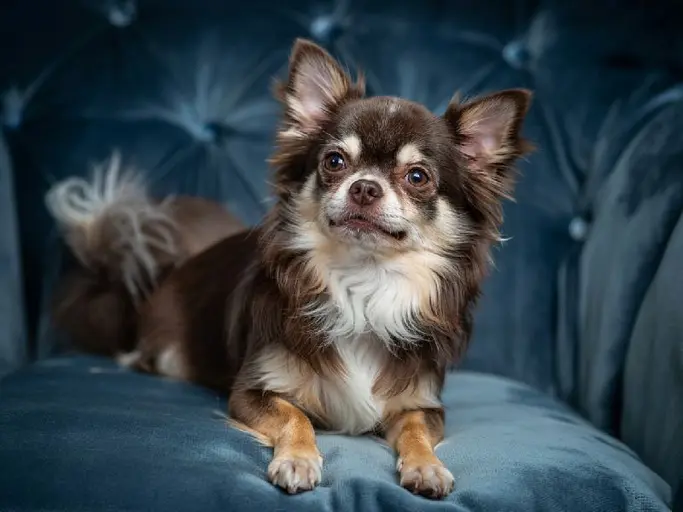Chihuahua: A Comprehensive Guide from Our Dog Experts

Brief Introduction
The Chihuahua is one of the smallest dog breeds in the world, instantly recognizable for its tiny size and large, expressive ears. Don’t let their petite stature fool you; these little dogs pack a big personality! Chihuahuas are known for their loyalty, alertness, and often, their spunky attitude. They come in a variety of coat colors and types, making them visually appealing and appealing to a wide range of dog lovers. This miniature canine is a popular companion dog, but understanding their unique needs is crucial for ensuring a happy and healthy life for both you and your Chihuahua.
Breed History
Origins in Mexico
The Chihuahua’s history is shrouded in some mystery, but most believe they originated in ancient Mexico. The breed is named after the Mexican state of Chihuahua, where they were discovered in the mid-19th century.
Relationship to the Techichi
Many historians believe the Chihuahua is descended from the Techichi, a small, mute dog favored by the Toltec civilization in Mexico. Artifacts and artwork suggest that the Techichi played an important role in Toltec society, possibly as companions and even in religious ceremonies.
Development and Popularity
- The breed was introduced to the United States in the late 19th century.
- Their small size and charming personalities quickly made them popular pets.
- The American Kennel Club (AKC) recognized the Chihuahua in 1904.
- The breed’s popularity has fluctuated over the years, but they remain a consistently popular choice for apartment dwellers and those seeking a small companion.
Appearance
Size and Weight
Chihuahuas are known for their diminutive size.
- Height: Typically ranges from 6 to 9 inches (15 to 23 cm).
- Weight: Usually between 3 and 6 pounds (1.5 to 3 kg). Some individuals may fall slightly outside this, but ideally they stay within these parameters for health reasons.
Coat Types and Colors
Chihuahuas come in two main coat types:
- Smooth Coat: Short, glossy, and close-lying.
- Long Coat: Soft, slightly wavy to straight, with feathering on the ears, legs, and tail.
The color palette is incredibly diverse.
- Common colors include fawn, black, white, chocolate, cream, red, and sable, as well as various combinations and markings.
Head and Facial Features
A Chihuahua’s head shape is a defining characteristic.
- They have a distinctive “apple head” shape, which refers to a rounded skull.
- Their muzzle is short and slightly pointed.
- The eyes are large, round, and expressive, typically dark in color.
Ears and Tail
- The ears are large and erect, flaring out to the sides.
- The tail can be either curved over the back or held to the side. In some countries, docking used to be practiced, but this is now considered inhumane and often illegal. Regardless, regardless of the tail carriage, it should move when the dog is happy.
- A long-haired Chihuahua will have a plumed tail.
Character and Behavior
Temperament and Personality
- Chihuahuas are known for their big personalities despite their small size. They can be confident and sassy.
- They tend to be very loyal and often form a strong bond with one particular person.
- They can be wary of strangers and other animals, sometimes exhibiting a tendency to be protective of their owners.
Attitude Towards People and Children
- While generally good with their families, Chihuahuas may be less tolerant of young children, especially if the children are not gentle or respectful.
- Supervision is always recommended when Chihuahuas are around children to prevent accidental injuries and ensure the dog’s comfort.
Interaction with Other Animals
- Chihuahuas can be territorial and sometimes aggressive towards other dogs, particularly larger ones.
- Early socialization is critical to help them learn to interact appropriately with other animals. Training classes and controlled environments are essential.
Activity Level and Exercise Needs
- Despite their small size, Chihuahuas do need regular exercise.
- Short walks, indoor play sessions, and puzzle toys can help keep them physically and mentally stimulated.
- They are not high-energy dogs, so their exercise needs are relatively easy to meet.
Trainability
- Chihuahuas can be independent and strong-willed, which can sometimes make training challenging.
- Positive reinforcement techniques, such as treats and praise, work best.
- Consistency and patience are crucial, and early socialization is recommended to help them become well-adjusted adults.

Care and Maintenance
Grooming Needs
- Smooth Coat: Weekly brushing is sufficient to remove loose hair and keep their coat shiny.
- Long Coat: Requires more frequent brushing, ideally several times a week, to prevent mats and tangles.
- Both coat types benefit from occasional baths as needed.
Exercise and Training
- Chihuahuas need daily exercise, but it doesn’t need to be strenuous.
- Short walks, indoor play, and puzzle toys are sufficient.
- Early socialization and obedience training are important to prevent behavioral problems.
Feeding
- Feed your Chihuahua a high-quality dog food formulated for small breeds.
- Their metabolism is high, so they need frequent, small meals.
- Be careful not to overfeed them, as they are prone to weight gain. Obesity can lead to other health problems.
Health Considerations
- Chihuahuas are prone to certain health issues.
- Hypoglycemia (low blood sugar): Common in young puppies, so regular feeding is important.
- Patellar Luxation (dislocating kneecap): A common orthopedic problem in small breeds.
- Tracheal Collapse: A condition where the trachea weakens and collapses, causing breathing difficulties.
- Heart Problems: such as Mitral Valve Disease.
- Dental Problems: Due to their small mouths, dental care is vital. Regular brushing and professional cleanings are recommended.
Breed Weaknesses
Potential for Aggression
- Some Chihuahuas can be prone to barking and nipping, especially if they are scared or feel threatened.
- Proper socialization and training can help minimize these tendencies.
Loyalty and Attachment
- While Chihuahuas are incredibly loyal, their attachment can sometimes lead to separation anxiety.
- Training to be comfortable alone and providing plenty of mental stimulation can help manage this.
Specific Weaknesses
- Their small size makes them vulnerable to injuries.
- They are sensitive to cold weather and may need sweaters or coats in cooler climates.
- They can be picky eaters.
Conclusion
The Chihuahua is a small but mighty companion dog with a big personality. They are best suited for owners who can provide them with consistent training, socialization, and plenty of love and attention. Chihuahuas can be wonderful pets for singles, seniors, and families with older, gentle children. If you’re prepared to meet their unique needs, a Chihuahua can be a delightful and devoted addition to your life. They are a great choice for people who live in apartments or who are looking for a low-energy dog, but still want a playful canine companion.
Frequently Asked Questions About Chihuahua
-
What is a Chihuahua known for?
Chihuahuas are known for their tiny size, large, expressive ears, loyalty, alertness, and spunky attitude. They come in a variety of coat colors and types.
-
Where did the Chihuahua originate?
The Chihuahua originated in ancient Mexico and is named after the Mexican state of Chihuahua, where they were discovered in the mid-19th century.
-
How big do Chihuahuas get?
Chihuahuas typically range from 6 to 9 inches in height and weigh between 3 and 6 pounds.
-
What coat types and colors do Chihuahuas come in?
Chihuahuas come in two main coat types: smooth and long. Common colors include fawn, black, white, chocolate, cream, red, and sable, as well as various combinations and markings.
-
Are Chihuahuas good with children?
While generally good with their families, Chihuahuas may be less tolerant of young children, especially if the children are not gentle or respectful. Supervision is always recommended.
-
How much exercise do Chihuahuas need?
Chihuahuas need regular exercise, but they are not high-energy dogs. Short walks, indoor play sessions, and puzzle toys can help keep them physically and mentally stimulated.
-
Are Chihuahuas easy to train?
Chihuahuas can be independent and strong-willed, which can sometimes make training challenging. Positive reinforcement techniques work best.
-
What are some common health problems in Chihuahuas?
Common health issues in Chihuahuas include hypoglycemia, patellar luxation, tracheal collapse, heart problems, and dental problems.
-
Are Chihuahuas prone to aggression?
Some Chihuahuas can be prone to barking and nipping, especially if they are scared or feel threatened. Proper socialization and training can help minimize these tendencies.
-
Are Chihuahuas good apartment dogs?
Yes, Chihuahuas are a good choice for people who live in apartments or who are looking for a low-energy dog.

